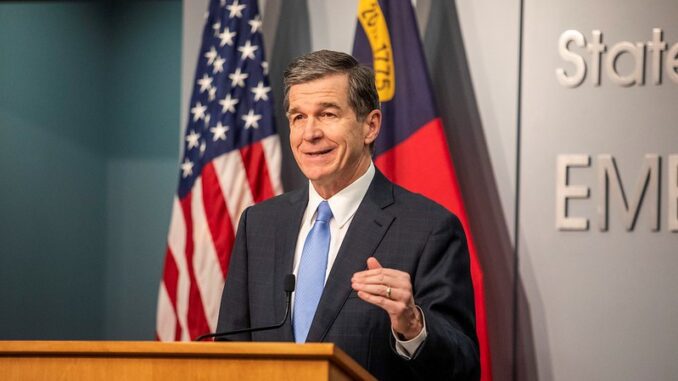
RALEIGH — At about 11 a.m. on Friday, May 21, North Carolina House Majority Leader John Bell (R-Wayne) released a letter, signed by 60 members of his Republican caucus members, calling on Gov. Roy Cooper to reinstate work-search requirements for those on unemployment in order to encourage the jobless to return to work. Hours later, Cooper complied, signing Executive Order 216.
“In our districts, we continue to hear from small business owners who are unable to fill new jobs,” the House GOP letter stated. “We believe reinstating work search requirements is a common-sense step to help connect the unemployed with new job opportunities.
The letter cited data from the North Carolina Restaurant and Lodging Association saying state restaurants are 70,000 workers short compared to their workforce before the pandemic — a 17% drop overall. And that’s just one industry of many saying they are in dire need of workers.
Cooper’s executive order directs the state’s Department of Commerce on June 6 to require the standard work-search criteria from those receiving unemployment benefits. In order to continue receiving benefits, the unemployed will be required to set up an account on ncworks.gov and will have to show they have applied for at least three jobs per week. Cooper already took this step with new beneficiaries on March 1, but this would now apply to existing beneficiaries as well.
“Unemployment benefits have provided a critical lifeline for many North Carolinians living on the edge due to the pandemic,” Cooper said in a release. “As our state emerges from the pandemic, we want to help people safely return to work as soon as possible. Reinstating the work search guidelines will help connect claimants with employers, resources and tools to help them return to the workforce.”
The governor’s release stated that North Carolina has distributed over $11.7 billion in unemployment benefits since the pandemic began, and there are currently 245,000 people in the state receiving the weekly benefit payments.
“This is welcome news. We appreciate the Governor taking this common-sense step,” Bell told NSJ in an email on May 25. “However, we must continue to look for ways to get people off unemployment and back to work. Those discussions are ongoing.”
This change to how North Carolina’s unemployment benefits are distributed comes amidst a national examination of whether generous benefits are hurting employment growth. At the center of the debate is whether states should continue to accept a $300 federal “bonus” that is being added to each beneficiary’s payments.
On May 7, after disappointing job numbers from April showed 266,000 new jobs — far under the 1 million that Dow Jones had predicted for the month — the U.S. Chamber of Commerce released a statement blaming the $300 bonus and saying it needed to be ended immediately.
“The disappointing jobs report makes it clear that paying people not to work is dampening what should be a stronger jobs market,” said Neil Bradley, U.S. Chamber of Commerce executive vice president and chief policy officer, in the statement. “One step policymakers should take now is ending the $300 weekly supplemental unemployment benefit. Based on the Chamber’s analysis, the $300 benefit results in approximately one in four recipients taking home more in unemployment than they earned working.”
After this statement, Republican-led states responded by passing laws rejecting the federal bonus, with 22 making this move so far. The bonus will expire in September if not extended again in further stimulus and recovery plans.
In North Carolina, it’s not just the House and the governor trying to come up with solutions for the issue; the state Senate Commerce and Insurance Committee debated a proposal on May 20 to give workers a $1,500 bonus if they agree to get off unemployment and return to work. Sen. Tom McInnis (R-Richmond), a co-chair of the committee, told NSJ that the legislation was a proposed committee substitute that was for “discussion only” at this point.
President Joe Biden rejected the idea that Americans were passing up work to remain on unemployment, saying May 10 that “the people who claim Americans won’t work even if they find a good and fair opportunity underestimate the American people.”
Biden did propose a few solutions to get people to return to work, though. He said, “Employers can hire back their laid-off workers part time without those workers having to give up all of their unemployment benefits.”
Despite Biden’s assertion that it is lack of childcare and fear of COVID that are keeping people from returning, analysis by Business Insider does show that state unemployment benefits plus the federal $300 bonus amount to more than the minimum wage in every state, often significantly more. It is even higher than the average wage in three states and is more than 90% of the average in six others.
In North Carolina, this debate has echoes of a 2013 controversy over former-Gov. Pat McCrory cutting unemployment benefits to try to encourage people to return to work. Writing on May 19 in the Washington Examiner, McCrory suggested that his efforts were a success, and other states should take note. In the piece, titled, “Federal unemployment policies should follow North Carolina’s example,” he said after large “Moral Monday” protests and constant verbal assaults wherever he went, he began to wonder if the decision would indeed hurt the poor rather than encourage work.
“Fortunately, though, within two months, our administration’s worst fears and our critics’ hysterics were put to rest when the workforce numbers began to change,” McCrory wrote. “Jobs were being filled, unemployment dropped, and, by January 2014, North Carolina’s jobless rate had plunged to 6.7%, which the New York Times identified as ‘the sharpest drop in the country.’”

